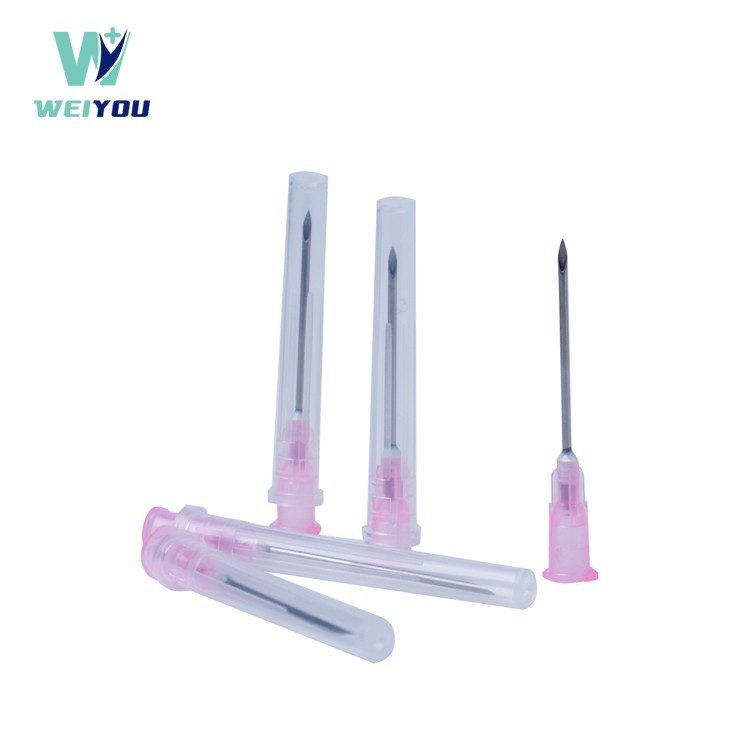- English
- Español
- Português
- русский
- Français
- 日本語
- Deutsch
- tiếng Việt
- Italiano
- Nederlands
- ภาษาไทย
- Polski
- 한국어
- Svenska
- magyar
- Malay
- বাংলা ভাষার
- Dansk
- Suomi
- हिन्दी
- Pilipino
- Türkçe
- Gaeilge
- العربية
- Indonesia
- Norsk
- تمل
- český
- ελληνικά
- український
- Javanese
- فارسی
- தமிழ்
- తెలుగు
- नेपाली
- Burmese
- български
- ລາວ
- Latine
- Қазақша
- Euskal
- Azərbaycan
- Slovenský jazyk
- Македонски
- Lietuvos
- Eesti Keel
- Română
- Slovenski
- मराठी
- Srpski језик
How to Choose the Right Veterinary Injection Needle for Your Pet
2024-12-25
Choosing the right veterinary injection needle for your pet is crucial for ensuring effective treatment while minimizing discomfort and potential complications. Here’s a guide to help you select the best needle for your pet’s needs:
1. Needle Size (Gauge and Length)
- Gauge: The gauge refers to the diameter of the needle. A higher gauge means a smaller needle. For pets, it's important to choose the right gauge to ensure the injection is comfortable and effective:
- Small Pets (e.g., cats, small dogs): Typically, 22-25 gauge needles are suitable for subcutaneous or intramuscular injections.
- Larger Pets (e.g., large dogs, horses): Use 18-22 gauge needles, as they can accommodate larger volumes of medication.
- Length: The length of the needle depends on the area of injection and the size of your pet:
- Subcutaneous Injections: Generally, a 1/2 inch needle works well for most pets.
- Intramuscular Injections: A longer needle (5/8 to 1 inch) is often required to reach the muscle layer.

2. Type of Injection
- Subcutaneous (SQ): These are the most common injections for pets, administered just under the skin. Typically, a smaller gauge (22-25) needle is used.
- Intramuscular (IM): For injections into the muscle, a slightly larger needle (18-22 gauge) and longer length may be necessary to ensure the medication is delivered deep into the muscle.
- Intravenous (IV): A fine needle with a very small gauge (22-25) is usually used for IV injections, as they are given directly into the vein.
3. Medication Type
- Viscosity: The thickness of the medication can determine the needle gauge. For thicker medications (like certain antibiotics), a larger gauge (18-20) needle may be necessary.
- Volume: Larger doses or multiple doses of medication will often require larger needles (18-22 gauge) to handle the increased volume.
4. Pet Size and Age
- Small Pets: Kittens, puppies, and small adult pets generally require smaller needles (22-25 gauge) to minimize discomfort.
- Large Pets: Larger pets may require slightly larger needles (18-22 gauge) to accommodate larger volumes of medication or to reach deeper tissues for muscle injections.
5. Needle Quality
- Sharpness: Choose needles from reputable brands that ensure sharpness to reduce tissue trauma and pain for your pet.
- Sterility: Always opt for sterile, single-use needles to avoid the risk of infections.
- Material: Stainless steel needles are commonly used as they are strong, durable, and resistant to corrosion.
6. Injection Site
- Subcutaneous (Under the Skin): Typically in the scruff of the neck or behind the shoulder blades. A shorter needle (1/2 inch) and smaller gauge (22-25) are appropriate for these areas.
- Intramuscular (Into the Muscle): Muscular injections are usually administered into the thigh or hind leg muscles. A slightly longer needle (5/8 - 1 inch) and a medium gauge (18-22) are preferred.
- Intravenous (Into the Vein): IV injections are usually given in the forelimb or jugular vein, requiring a smaller needle (22-25 gauge) and proper technique.
7. Frequency of Use
- Frequent Injections: If your pet requires regular injections (e.g., insulin shots), you may want to choose thinner, shorter needles (such as 25 gauge, 1/2 inch) to reduce discomfort and needle fatigue.
- Occasional Use: For single or less frequent injections, a larger gauge (18-22 gauge) may be acceptable depending on the medication.
8. Ease of Handling
- Comfortable Grip: Ensure the needle is easy to hold and control during the injection process, which can reduce stress for both you and your pet.
- Type of Syringe: The syringe size should match the needle gauge to avoid overfilling, which can cause discomfort and difficulty during administration.
9. Professional Guidance
- Consult Your Veterinarian: Always consult your vet for guidance on the correct needle size and type for your pet’s specific medication, health condition, and injection site.
- Training: If you are administering injections at home, your vet will provide training on how to properly handle and inject the medication to ensure your pet's safety and comfort.
10. Needle Disposal
- Safe Disposal: Always dispose of used needles in a proper sharps container to prevent injury and ensure safe disposal.
By considering these factors, you can choose the right veterinary injection needle for your pet’s needs, ensuring a smoother and more comfortable experience for both you and your pet.
Weiyou® manufacture and supply veterinary needles which is very high quality. As a manufacturer in China, Weiyou® veterinary needles has competitive price advantage, and ensure the quality high. Weiyou® manufactures and supplies veterinary needles of various sizes, and we has a low-price advantage. Various sizes are available and OEM is acceptable.Visit our website at www.zjweiyou.com to learn more about our products. For inquiries, you can reach us at dario@nbweiyou.com.



